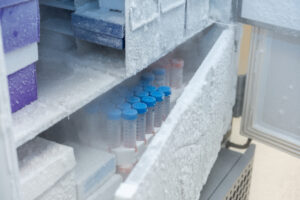Selecting the right laboratory equipment is essential when considering the viability of biological materials requiring controlled temperature environments. Temperature requirements vary based on material classification. Equipment specifications dictate the appropriate chamber size and temperature profile to satisfy the need.
Here are some general storage temperature ranges and considerations:
- Ambient/ Room Temperature Storage: Some biological samples and reagents can be kept at room temperature (+15-30°C) in a climate-controlled building. Typically, this includes paraffin tissues or biological specimens preserved in fixative solutions like formalin or alcohol. Storing retains or shelf-life products can also be stored at room temperature. It is important to note that room temperature storage is not suitable for all samples, as most critical materials are sensitive to degradation and/or microbial growth.
- Refrigerated Storage: Many materials require colder temperatures below room temperature. Refrigerated storage is defined by temperatures between +2°C and +8°C. This range is suitable for slowing metabolic degradation or maintaining stability and preserving the integrity of various samples for a short period.
- Mechanical Freezer Storage: Freezer storage provides colder temperatures that can preserve the integrity of biological materials over more extended periods. Typical freezer temperature ranges include -20°C to -80°C. Laboratory freezers at -20 °C are suitable for short- to medium-term storage, including DNA/RNA, proteins, and enzymes. Ultra-low-temperature freezers at -80°C provide a high-quality option for long-term preservation of highly sensitive materials.
- Cryogenic Storage: Extremely low temperatures, typically below -135°C or below, are necessary for long-term storage of biological samples, stem cells, tissues, and specific molecules sensitive to temperature fluctuations. Cryogenic storage options include liquid nitrogen freezers, also known as cryogenic freezers, which can maintain ultra-low temperatures and provide a secure environment for sample preservation. The extremely low temperatures achieved with liquid nitrogen (-196°C) effectively suspend all biological activity, preventing degradation and maintaining the integrity of the material for more extended periods.
Finding Quality Lab Cold Storage Equipment
Determining the temperature ranges best suited for the materials in your laboratory is important, but there are other considerations for an effective cold storage strategy. Another vital part of the process is choosing quality equipment that meets all the organization’s needs. It is essential to consider the capacity, accessibility, monitoring capabilities, efficiency, security, and safety features of the equipment when selecting an appropriate storage solution.
- Capacity – When choosing the appropriate design and size of the cold storage equipment, consider factors such as available floor space, sample volume, and the need for future expansion. Assessing the laboratory’s layout and workflow is essential when selecting the appropriate storage solution. Options include under-counter, chest, or upright freezers/refrigerators and small capacity to bulk-size cryogenic freezers.
- Accessibility – When accessing material in a cold storage unit, it is crucial to decrease the time the doors are kept open, reducing fluctuations in temperature and jeopardizing the integrity of the material stored. Laboratories can optimize their storage space, maintain sample integrity, and promote efficient sample organization and retrieval using inventory management systems such as freezer racks, boxes, frames, and canisters.
- Monitoring Capabilities – Monitoring a freezer or refrigerator’s minimum and maximum temperature range is critical to ensure the integrity of the stored material. Real-time monitoring systems allow immediate detection of deviations from the desired temperature range. By incorporating an independent temperature monitoring system, laboratories can quickly and effectively detect and respond to temperature fluctuations or excursions, reducing damage.
- Efficient Energy Needs – Different freezer types have varying energy requirements, but higher-quality and newer freezers tend to contain more advanced technology that uses energy more efficiently. This efficiency can reduce energy consumption and operating expenses and make replacing older units more affordable.
- Security – A secure freezer can help ensure that only authorized individuals gain access to the stored material. Freezers can have traditional lock and key security systems or more advanced systems like biometrics, depending on the level of security required.
By carefully assessing the specific requirements of the materials and selecting the appropriate equipment, researchers, clinicians, and pharmaceutical professionals can ensure the integrity, viability, and longevity of their valuable samples.
The Right Cold Storage with Pacific Science, LLC
At Pacific Science, LLC, we have a team of experts with over 150 years of combined experience in the life science industry. We aim to use our expertise and experience to support our clients. We understand the challenges scientists and researchers face, and we are committed to offering innovative solutions that incorporate proven technology to preserve critical material at required temperatures.
We offer a wide range of cold storage products from various manufacturers to meet the diverse needs of laboratories. Our products are available in multiple configurations and temperature ranges, ensuring we can meet all your storage needs.
Contact Pacific Science, LLC, and speak with a representative. Learn how we can help with your cold storage needs.






